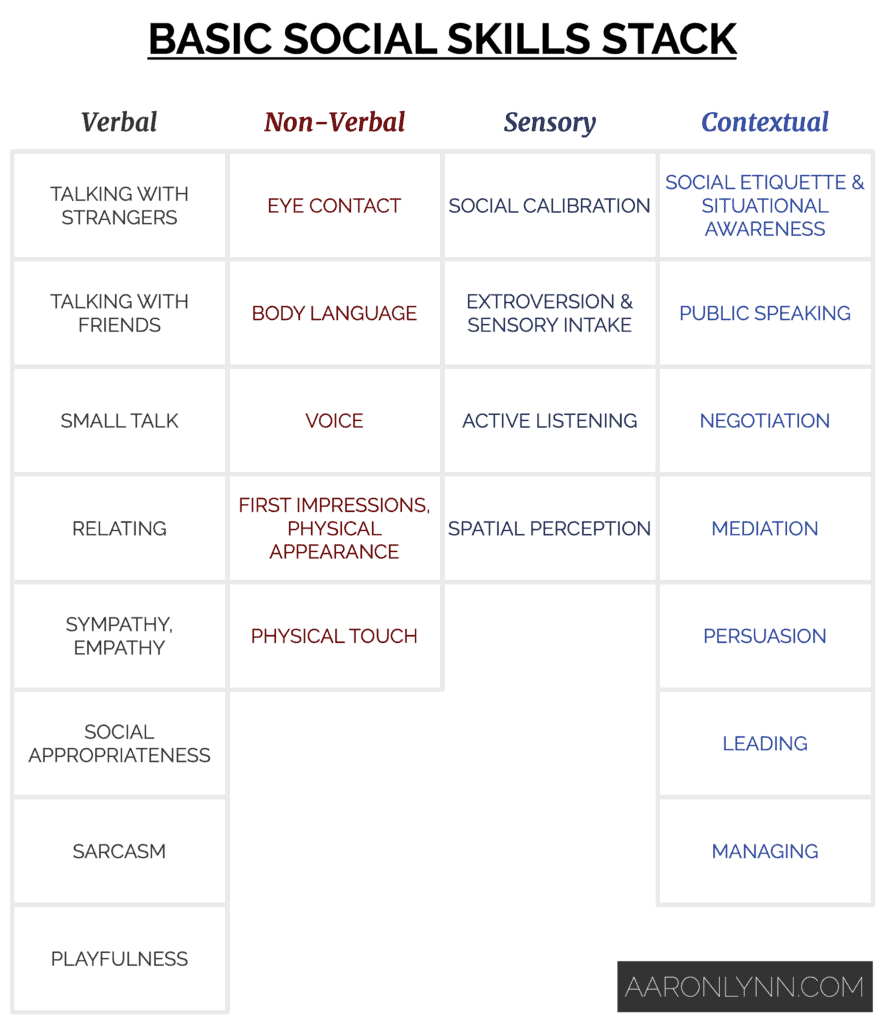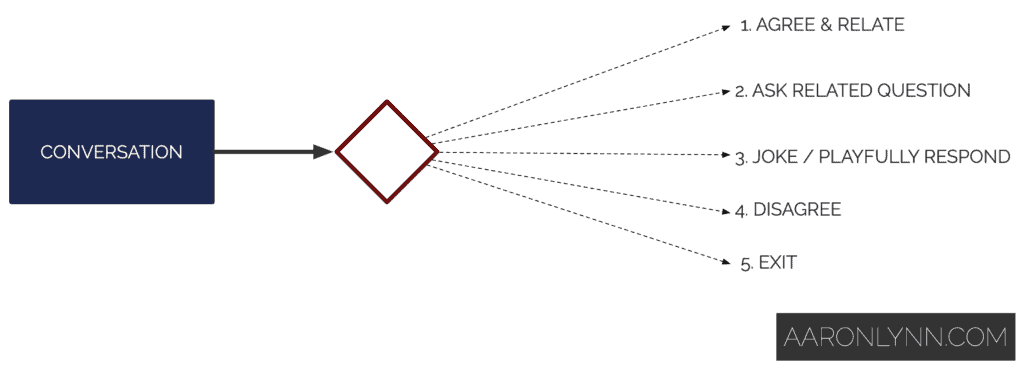
People say that social skills are something you are either born with or not.
I don’t believe that is true.
It’s a bit of a cop-out to simply say that some people are good people-people, while others are not.
Others will say that you can only learn social skills through experience, and that they cannot be broken down into component pieces and learnt bit-by-bit.
This is sort-of true.
Experience does count, yes.1Experience is also known as practice.
But social skills can also be defined, unpacked and purposefully studied.
You can learn them.
You can practice them.
And you can get better at them.
But first have to know what they are.
A Guide to Basic Social Skills
This is the guide that I wish I could have handed my socially-inept fourteen year-old self and said, “Hey, here are all the things you have to figure out if you want to function in adult society.”2For motivation I would also have added, “Oh and if you ever want to go out with that cute girl from down the street, you DEFINITELY need to figure all this out.”
Think of it as a map of all the basic social skills that everyone should have. You still have to visit each skill to learn more about it, but at least you will now know what to look for.
Why Do We Need Basic Social Skills?
So why do we even need basic social skills in the first place?
Well, by now you likely know about social atomisation and its effects.
Technology has allowed us to broadcast, comment and like stuff… but we do still need to relate to people.
Humans are social creatures. We were put on this planet not only to do good, but to help do it for others as well.
Social skills are unfortunately not taught in school. We are simply expected to pick them up on our own.
And the age-old advice of “just be yourself” doesn’t cut it. Especially when your “be yourself” baseline doesn’t work and doesn’t get you where you want to go.3“Just be yourself” is the worst advice when you have no skill, and the best advice when you have a high level of skill.
So let’s break down the Basic Social Skills Stack.
The Basic Social Skills Stack
This is what I consider the Basic Social Skills Stack.
Most of these skills are interpersonal or intercessional, meaning they involve one-to-one or small group communication.
The list is not exhaustive, and there is a lot of crossover between the different categories, due to the fluid and multi-modality nature of communication.
There is also a whole set of advanced skills that have been purposely excluded from the stack – those are for another time.4Advanced social skills include things like: understanding social hierarchies, managing relationships, taking social risks, social skill mindsets.
One of the reasons I put together this Stack is because if you Google “social skills”, you typically end up with a bunch of generalisations.
Things like “effective communication” or “get rapport”.
Seriously, what does that even mean?
Let’s get specific about this.
Verbal Social Skills
Verbal social skills are those that involve speaking, words and language.
Talking With Strangers
Let’s start with the big one – talking with complete strangers.
No, I’m not talking about your Uber driver or the barista you see every day.
I am talking about purposefully having a conversation with a complete stranger you are meeting for the first time, perhaps at a networking event or at a large dinner with friends.
Working out how to break the ice, and then segue that into conversation is most definitely a skill.
I personally like to start with, “Hey, I don’t think we’ve met yet. I’m Aaron.”
Talking With Friends, Acquaintances and Family
This skill is pretty self-explanatory and includes your friends, family and co-workers.
This is more about communicating your needs/wants with them and not feeling like you need to constantly communicate with them.
Small Talk
“Small Talk” is about mastering the flow of conversation.
This diagram serves as a better explanation:
For each thing someone says, you can:
- Agree and relate.
- Ask a related question.
- Joke or playfully respond to it.5Humour is universally pleasant.
- Break rapport or disagree.
- Exit the conversation.
Some cultures are better at small talk than others.
A good way to think about small talk is:
How do I create an entertaining and interesting conversational flow, so that I can turn something otherwise meaningless into something of value for both of us?
Relating
Relating is the ability to uncover commonalities and differences with others through conversation.
Sympathy and Empathy
Sympathy is feeling your own (usually negative) emotions about another’s situation.
Empathy is putting yourself in another person’s shoes and trying to experience what they feel.
Both are usually in-built, but some people have trouble distinguishing between the two and knowing which is appropriate.
Social Appropriateness
Social appropriateness is a huge topic within basic social skills. It is partly verbal, and partly contextual.
I truly believe that there are certain things that should just not be done in social situations.
Most social situations require nuance – like knowing when the right time is to relate, to laugh, or to tease, and to what degree.
Some parts of social appropriateness are cultural and some are universal.
Sarcasm
Sarcasm is mostly found in Western culture,6Mostly. There are some European cultures that do not heavily utilise sarcasm. and if you’re reading this, you likely speak English and you have to know how to deal with it.
Done properly, sarcasm should be humorous, not spiteful.
Playfulness
I would almost consider playfulness an advanced social skill. It is the ability to inject a bit of humour or lightness into everything you communicate.
Look, we all know that the world is absolutely bonkers right now, but there’s no need for the conversations we have to all be super-serious.
Nonverbal Social Skills
Nonverbal social skills are those conveyed with your body movements, including the qualities of your voice.
Eye Contact
The popular saying goes that the eyes are the window to the soul.
I prefer the scientific explanation:
When we look into someone’s eyes, we are picking up on thousands of micro-movements, and our brain translates that into thoughts and emotions for us.
Knowing what is appropriate eye contact, when to hold it, when to break it, and how to communicate more powerfully with your own eye contact, is an essential non-verbal social skill.
Body Language
How you use your body to communicate is a social skill.
This could be your facial expressions – how you move and hold the muscles of your face when talking.
It could be your posture, or how you hold your physical body.
It is also your body positioning, or how you use your body to position yourself in social situations and what that does to the dynamics of a situation.
Voice
There are a lot of different aspects to voice.
They include:
- Volume. How loud you talk.
- Intonation. The intent behind your speech communicated by a rise or fall in speech patterns.
- Pitch. Whether you sound more like Morgan Freeman or Justin Bieber.
- Rhythm. How fast, slow and to what rhythm you speak.
- Resonance. How rich your voice sounds.
- Silence. When you choose not to speak at all.
Generally the more control you have of your voice, and the more pleasant sounding it is, the better you will be at communicating.
First Impressions and Physical Appearance
How you physically look, dress and groom yourself and what first impression that conveys is a basic nonverbal social skill.
It is one of the easiest social skills to improve upon.
Physical Touch
How you communicate with others through appropriate physical touch, be it a handshake or a pat on the back, is also a basic social skill.
Sensory Social Skills
Sensory social skills are about using your senses to read and interpret information about the social situation and others around you.
Social Calibration
If social appropriateness is about knowing what to say or how to say it, then social calibration is what helps you make that decision.
It is the ability to read, understand and interpret other people’s body language, facial expressions, speech and words.
Extroversion and Sensory Intake
Related to social calibration is how “extroverted” you are to the world around you, and how much information you are taking in through your senses.
Think of it as how attuned you are to what is going on around you or how much you are not inside your head.7Most people nowadays are too engrossed in their phones to realise what’s going on around them.
Active Listening
Active listening is a super important basic social skill and yet so few people actually do it. Most people have just learnt to politely nod their heads and silently tune out.
Active listening is the ability to listen, understand and maybe even empathise with or be interested in the topic of conversation.
Spatial Perception
Spatial perception is the term I came up with to describe people’s ability to navigate the three-dimensional space around them, including objects and other people.
It helps with things like knowing how close to stand next to someone, or how far to project your voice.
Most people today have terrible spatial perception because they spend most of their days looking at things on two-dimensional screens.
Contextual Social Skills
Contextual social skills are the skills related to the basic social contexts that most of us will find ourselves in on a daily basis.
Social Etiquette and Situational Awareness
Social etiquette is a formal subset of social appropriateness.
Situational awareness is the everyday version of that. The Japanese call it 場の空気を読む.
Both cover little contextual things like which cutlery to use first, or who buys the first round.
It is about knowing what the unspoken social rules are in a given situation, how to act appropriately and when it is appropriate to break them.
Public Speaking
I believe that everyone should understand the basics of delivering a speech to a small audience.
Negotiation
Negotiation is knowing how to trade, how to barter and how to get what you want out of a deal.
It is also about knowing how far to push, understanding BATNA8Best alternative to negotiated agreement. and when you need to leave a little something on the table so that future trade can occur.
Mediation
Mediation is what is called an intercessional skill, where you help be the middle ground and resolve a conflict between two parties.
This is a key social skill for workplaces.
Persuasion
Persuasion is one of the most important basic social skills and is about getting people to see, understand and perhaps even agree with your perspective.
It includes things like rhetoric and logic and covers both speech and the written word.
Leading People
Leading people is the ability to inspire everyone to act in alignment with a singular vision.
Not everyone enjoys leading, but everyone should be able to do it when it is required of them.
Managing People
Managing people is almost the opposite of leading. It is the ability to recognise people’s strengths and weaknesses based on their differences, and to help them perform to the best of their abilities.
Being able to both lead and manage people is a bit of a paradox, but extremely valuable socially.
What To Do Next
If you are reading this you already know that social skills can be learned, improved upon and eventually mastered.
As you have just seen, there is a large spectrum of basic social skills.
It’s worth asking – which basic social skills do you already have, and which do you need to develop?
Update: I have released a guide specifically for introverts to learn these skills at an extrovert-level.
If you would like to hear more about any of the specific basic social skills, reach out to me on Twitter.
- Experience is also known as practice.
- For motivation I would also have added, “Oh and if you ever want to go out with that cute girl from down the street, you DEFINITELY need to figure all this out.”
- “Just be yourself” is the worst advice when you have no skill, and the best advice when you have a high level of skill.
- Advanced social skills include things like: understanding social hierarchies, managing relationships, taking social risks, social skill mindsets.
- Humour is universally pleasant.
- Mostly. There are some European cultures that do not heavily utilise sarcasm.
- Most people nowadays are too engrossed in their phones to realise what’s going on around them.
- Best alternative to negotiated agreement.
Photo by Jason Rosewell.

